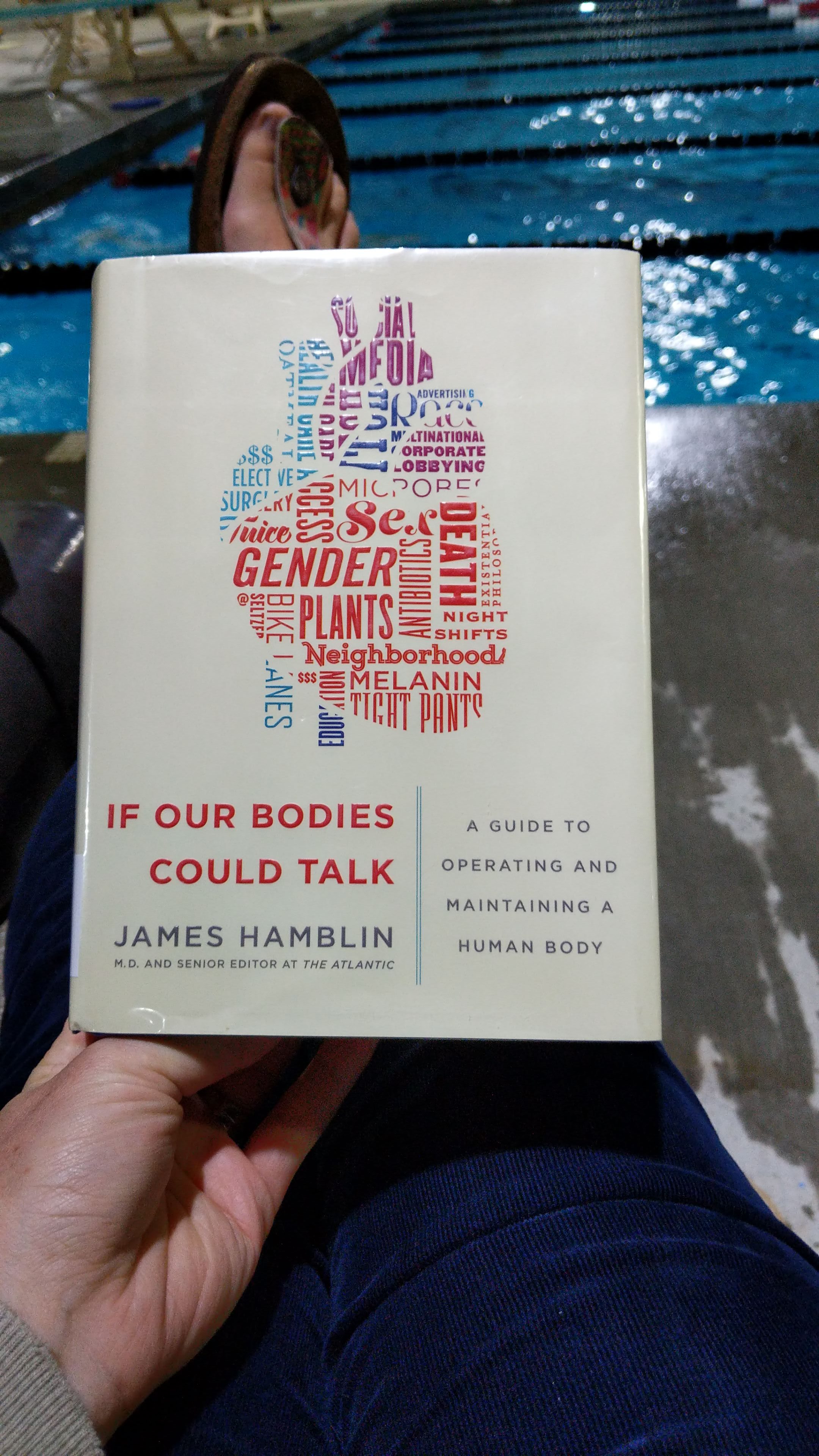James Hamblin’s _If Our Bodies Could Talk_
A soft goal for me this year is to write here more often, beyond the usual race report and training recaps, though as is the case with everyone, sometimes finding the time can be challenging. I’ll often think of a topic — or want to react to something I read or heard — but the opportunity to sit down and write doesn’t come as readily or easily as I’d like it to, and by the time it does, the news is no longer relevant or pertinent. Fortunately though, a book I just finished reading lit a fire under me, and I wanted to share it with you today (before I forget, meh).

Early yesterday morning, I finished a book that basically blew me away on every page: James Hamblin’s If Our Bodies Could Talk: A Guide to Operating and Maintaining a Human Body. I’ll preface my commentary below with the obvious, that this isn’t #sponsored and that no one is paying me to talk about it — hell, I borrowed it from my local library — but I honestly thought that it had so much good stuff that I just had to write about it.
I love a good science writer, and Dr. Hamblin, an MD and senior editor at The Atlantic, delivers. Here’s the thing about science writing: sometimes it can be pretty inaccessible. My MA and MS are most definitely not in science fields, and it has been approximately 10 years since I was in a science classroom as a student. Suffice it to say that I’m not an expert and barely consider myself an “armchair scientist,” whatever the hell that is. Here’s the other thing about books like IOBCT: they’re usually written pretty disparately. You’ve probably seen books like this before, where you can quickly find the segment called why do men have nipples? or are we made to eat meat? or some other baity headline, get your answer (and be ready to rock your next trivia challenge), and move on. Those books are fine and well, and I enjoy them as much as anyone, but I think IOBCT turns that type of science writing on its head. It’s so, so much better.

What I really like about IOBCT, and Hamblin’s writing style in general, is that it is critical as absolute hell. I don’t want to give away too much about the book, but one of his main “arguments,” if you want to call it that, is that it’s hard to answer questions like the aforementioned because our body isn’t really composed of disparate parts; in other words, everything affects everything else. You can answer questions about why men don’t have nipples, but to really answer answer the question, it behooves you to also talk about the greater picture — think evolutionary biology, for example — but then also why you’re wondering that question in the first place — think gender norms and the societal commentary therein. The tangents have tangents, but these tangential asides are imperative to understand the answer (and the implication(s) for the question in the first place).
With me still?
It’s a little messy and complicated, but hey, that’s the human body. That’s the human condition.
The crux of the book is the idea of agnotology, and hot damn, is the idea of agnotology ever relevant in today’s political (and social, and environmental, and health) climates. Have some fun, and go google “agnotology” and then google “agnotology + Trump.” You’ll see what I mean. The book explores lots of cultural hot topics, like why is that so many people take copious amounts of vitamins and supplements, when the science again and again shows that most people absolutely don’t need them? Or why we should (not) avoid preservatives, “just to play it safe”? Or the efficacy or utility of taking probiotics, the nutritional (de)merits of consuming eggs instead of oatmeal, or the skewed thinking (and the history that leads us to believe) that we can somehow “boost” our immune system. These ideas — many of which are so ingrained in our society — exist for a reason, even if they’re scientifically pretty bunk. It’s willful, perpetuated ignorance, and when you begin thinking about the agnotology concept not just in our “post-truth” political environment (which is tragic, don’t get me wrong) but also in terms of our health — what we willfully do or do not do to or with our bodies — it becomes pretty scary, if not nefarious.
We have one body, kids. All our decisions (or non-decisions, as it were) matter.

There’s a lot of applicable ideas to the world of running, racing, and training, too, if you think about it. Just like anyone else in any other activity, we runners do things a certain way for a certain reason, whether it’s because “science” tells us that it’s optimal, because it’s rooted in a tradition that would be heretical to break, or some other combinative reason therein. When we begin to pull the veil back on “science” and see that the “studies” and “research” that purport that wearing compression socks will make you faster, or that drinking a “recovery drink” after every.single.run will help you get some fitness #gainz, and the like, we can begin to see that nothing is as tidy and clear-cut as it seems. Even the most critical amongst us can and are duped.
If you’re looking for a great read that’s both entertaining and informative — Hamblin’s writing is a little confusing initially, but it’ll grow on you — I can’t recommend If Our Bodies Could Talk enough.
You will be pissed after you finish this book, but you’ll be pissed with conviction and, importantly, for good reason.
7 thoughts on “James Hamblin’s _If Our Bodies Could Talk_”
Definitely sounds like an interesting and thought-provoking book! I like your last sentence that this book will get you pissed. Those books are challenging to read because I mainly want to read for pleasure. But sometimes we need to get our assumptions and preconceived notions examined…painful but necessary.
Glad to hear you’ll be writing more! Looking forward to reading your stuff. 🙂
🙂 I love getting fired up over a book! PS you made the right call last week. A complained about her ears bothering her on Friday, but she was fine. By Sunday morning, G woke up with a runny nose and now is in full-blown cold mode 😛
Wow! I’m always interested in books about medicine/health/science, and the social commentary aspect of it reminds me of that Sociology degree I have and never use 🙂 I sent a sample of this to my Kindle, it sounds interesting. T has been reading books in a similar vein but about finance and marketing, and WOW, that sounds like eye-opening stuff too. Definitely not pleasure reading (which is 99% of what I read) but yes, it’s sometimes good to get pissed off and have things to think about.
I think it’s really interesting stuff. Weirdly, I feel like as I’ve gotten older, I have little to no interest in fiction anymore. That was exactly the opposite when I was in undergrad! Nowadays I read maybe 1 fiction book a year (and probably complain about it, haha)
This sounds right up my alley. I find that stuff fascinating. I’ll have to check it out!
Also “Pissed With Conviction” is totally going to be the title of my memoir.
haha, yours and mine both!